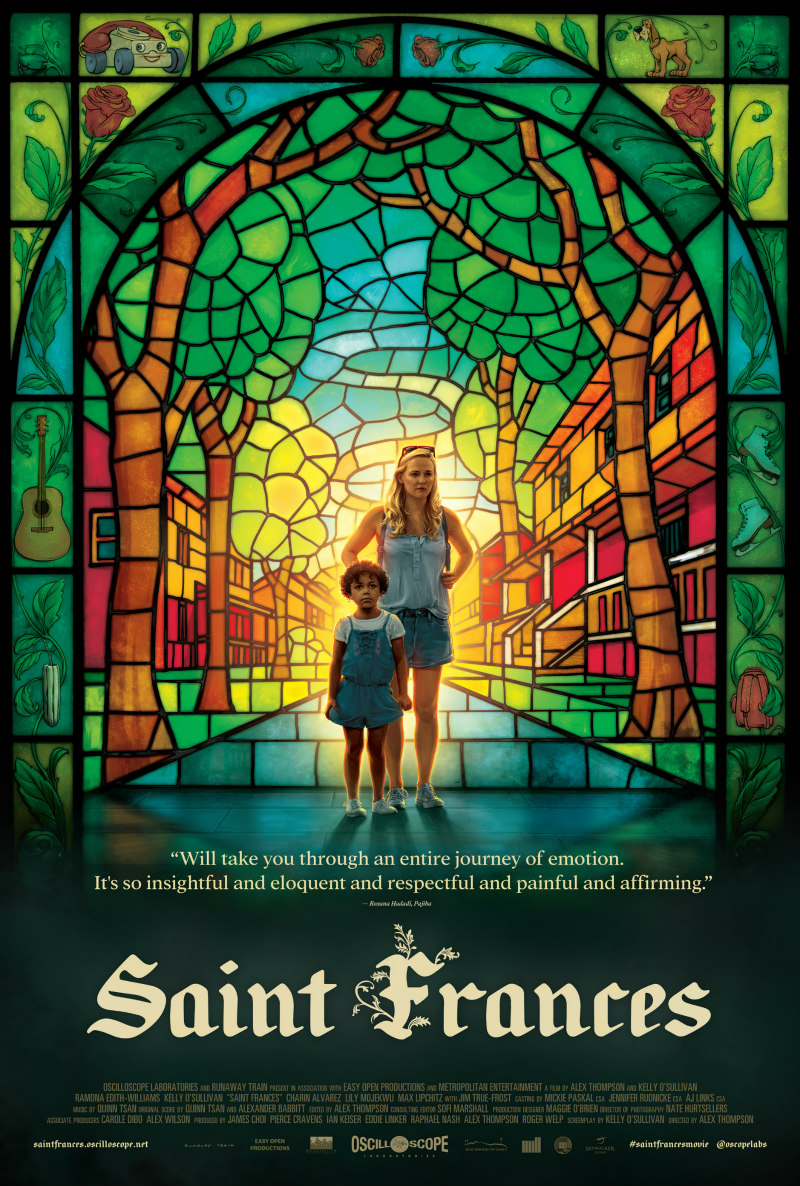
Review by
Benjamin Poole
Directed by: Alex Thompson
Starring: Kelly O'Sullivan, Charin Alvarez, Braden Crothers,
Ramona Edith Williams, Laura T. Fisher

With Kate Weinberg’s summer sleeper hit novel 'The Truants', the Sundance
smash
Never Rarely Sometimes Always
and now Alex Thompson’s indie drama Saint Frances, it seems as if graphic depictions of abortion, and the ensuing emotional
and physical fall outs which the procedure entails, have an insistent
contemporary currency. It is possible that this topic has gathered momentum
due to its prevalence in the news: as an entreaty to his bedrock Christian
conservative constituency, the American president vocally opposes
termination and pledged to overturn a landmark nationwide legalisation of
abortion during his 2016 campaign, stating that "Unborn children have never
had a stronger defender in the White House." Artistically, however, this
loose oeuvre may be a long overdue reaction to the taboo nature of abortion,
and by extension a belated discourse upon the enduring female biology
without which none of us would actually exist.

I’m no expert, but moments when period blood is visible or even mentioned within popular cinema seem few and far between. Isn’t there is a scene in the completely risible Superbad wherein a male character gets some on his jeans and it is meant to be hilariously awkward - not for the girl, but the prick lad himself, who is mortified? And Carrie expounds period shaming as a catalyst to mass murder. Therefore, it is completely refreshing within the first 10 minutes of Saint Frances to see protagonist Bridget (Kelly O'Sullivan, who also wrote the film’s screenplay), a world weary thirty-something, have sex with a guy she has met at a party and then the both of them waking up to discover that Bridget must have come on at some point during the act; it’s on the sheets in a very authentic looking splurge and also lightly smeared on both of their faces. Yes, the situation is a bit embarrassing, but the two eventually behave in a way that most human beings do - they just get on with changing the sheets and then have a shower, with the incident in fact providing another layer of intimacy. It is incredibly sweet.
[ READ MORE: New Release Review - Only the River Flows ]
O’Sullivan’s script (it is really her film, with Thompson’s visual dynamics
functionally serving the rhetorics of the screenplay) returns to uterine
blood as a leitmotif throughout the film. Finding herself pregnant, Bridget
decides to have a termination. The procedure goes as well as one could hope,
but for months and months later, Bridget bleeds through her sanitary pads in
increasingly invasive ways. These haemorrhages are a symbolic reminder of
the procedure, which hangs over the film as we undergo
Saint Frances’ narrative proper, wherein Bridget inexplicably becomes a nanny for a
lesbian couple who have recently given birth to a baby and need support
looking after their wayward other child, the four year old titular Frances
(Ramona Edith-Williams - brilliant!).

I say inexplicable because the sole motivation for Bridget becoming a child minder seems to be that she sees the role as an escape from the drudgery of her employment as a waitress. Bridget appears to have no affinity with children and is roundly awful at her job. With one of her mums suffering post-natal depression and the other a highly motivated careerist, Frances is understandably difficult: so, one does wonder why Bridget of all people is employed to look after her. She is late for work, and, in one moment, takes her eyes off Frances around a large body of water with disastrous results. Of course, the reason why the screenplay has Bridget as an unlikely nanny for this especially troubled kid is because the ensuing dynamic allows for much character conflict and the inevitable outcomes regarding self-discovery and overcoming personal demons.
[ READ MORE: New Release Review - Daddio ]
Thus, Saint Frances seems like a film which is more
ideologically driven than concerned with fashioning a convincing, evolving
narrative. Frances and Bridget bond over feeding the spoilt kid of a
neighbour carrots which a dog has licked: but it's ok, because his mum is a
pro-lifer who prioritises financial success over all else. There is much
made of Frances’ guitar tutor saying that she is a regular Joan Jett, and
when Frances asks who Jett is, Bridget replies not by saying that she was an
accomplished musician but that she was an important feminist figure (the
curse of any successful female rock star, and the reason why Hole were never
given dues for writing arguably the greatest rock-pop album of the '90s:
women in music are seen as women first and craftspeople second, a bogus
shibboleth). Bridget’s millennial nature is lamp-shaded by the dialogue,
and, indeed, perhaps this film will play more productively with that
demographic, who believe that these sorts of issues are interesting enough
in and of themselves. It is telling that Bridget’s midlife fears seem to
encroach when she compares her lot to the postings of her peers on social
media.

Throughout it all, O’Sullivan is a likeable and watchable presence, and the film passes engagingly enough due to the warmth of the two main characters. It is somewhat jarring, though, that within a film with such a purposefully diverse cast, in terms of sexuality, gender and ethnicity (aspects which the film makes sure to indicate), it ultimately falls to an attractive white woman to bring peace and understanding to disharmony between characters. Nonetheless, Saint Frances has its heart in the right place and as an exploration of a certain kind of female experience is both candid and entertaining.

Saint Frances is on MUBI UK from
August 16th.
